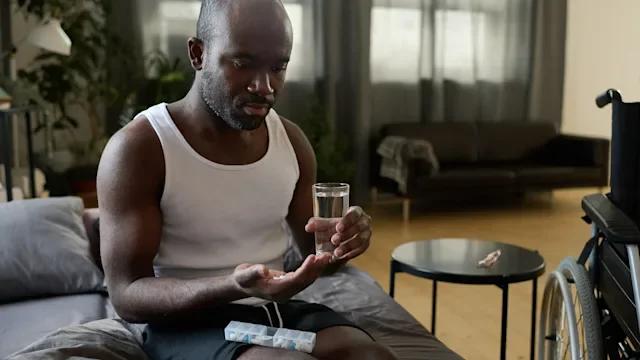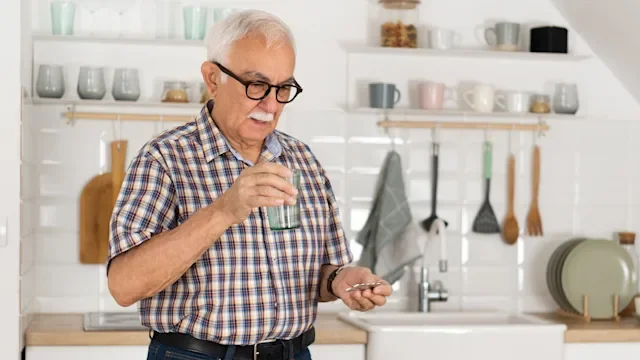Key takeaways:
Vitamin E acts as an antioxidant that helps protect your cells from damage. It’s found in foods like nuts, seeds, and some fruits and vegetables.
Adults need 15 mg of vitamin E per day. Most people can get all of this from a balanced and nutritious diet.
Vitamin E supplements aren’t appropriate for everyone and may even cause harm to some people.
Researchers are learning more and more about how different vitamins and minerals help against disease and keep chronic illness at bay. But, each and every vitamin and mineral functions differently to best support our health. Vitamin E doesn’t always get a lot of attention. But it’s a special antioxidant and is an important part of our diets.
What is vitamin E and why is it important?
Vitamin E is a fat-soluble vitamin that supports the immune system and overall cell function. It’s naturally found in eight different forms, all of which support our health.
Vitamin E is one of many antioxidants that may help promote longevity. Antioxidants work against free radicals that can damage or destroy cells. Free radicals are made within the body during exercise and digestion. They also come from external factors like smoking or pollution.
Search and compare options
An increase in free radicals has been linked to health concerns like cancer, neurodegenerative diseases, diabetes, rheumatoid arthritis, and asthma. So this essential vitamin is important as part of a balanced diet.
How much vitamin E do you need each day?
The recommended dietary allowance (RDA) for vitamin E is 15 mg per day for adults. The RDA in pregnancy is also 15 mg per day, but increases to 19 mg per day for lactating women.
The following table lists foods rich in vitamin E and their respective RDA.
Food | Recommended dietary allowance (RDA) |
Wheat germ oil, 1 tbsp | 135% |
Dry roasted sunflower seeds, 1 oz | 49% |
Dry roasted almonds, 1 oz | 45% |
Dry roasted hazelnuts, 1 oz | 29% |
Peanut butter, 2 tbsp | 19% |
Boiled spinach, ½ cup | 13% |
Vitamin E is also found in produce like broccoli, kiwifruit, tomatoes, and mango (at less than 10% of the RDA).
It’s possible to get enough vitamin E from diet alone. Vitamin E is often found in nutritious foods that offer additional benefits. So people who eat nuts, seeds, and produce can achieve the 15 mg daily vitamin E recommendation.
If you have allergies or food preferences, you may not consume enough foods rich in vitamin E. As a result, you may need supplementation to reach your vitamin E goals.
Do you actually need a multivitamin? According to research, there are actually fewer benefits to a multivitamin than you might think.
The best vitamins for older adults: As you age, it becomes more important to make sure you’re getting enough of these vitamins and minerals.
Is it safe to get supplements from Amazon? Learn some tips on how to make sure you’re getting a high-quality supplement — and one that’s safe.
What is the best vitamin E supplement?
Vitamin E supplements may come in the form of mixed tocopherols, alpha-tocopherol, gamma-tocopherol, or another form altogether. According to the National Institutes of Health (NIH), alpha-tocopherol is “the only form that is recognized to meet human requirements.” This makes it important to check your vitamin E supplement for its form and ensure you get alpha-tocopherol instead of another form.
If you need a vitamin E supplement, it’s also important to choose a high-quality supplement that keeps your safety and health top of mind. So here are a few other tips for choosing the best vitamin E supplement:
Search for a supplement with third-party testing to ensure its quality.
Purchase your supplement from a reputable seller for quality control.
Understand exactly what’s in your supplement. The supplement facts label provides information about what the supplement contains. This may include fillers, preservatives, or other nutrients.
Read more like this
Explore these related articles, suggested for readers like you.
It’s also important to keep in mind that some vitamin E supplements may be combined with other nutrients, like vitamin C. This is often used for added antioxidant support. Multivitamins may also contain vitamin E, up to 100% of the RDA or more. Always read your supplement labels to understand the total amount of the different vitamins you’re consuming.
Before you take a vitamin E supplement, it makes sense to check with a healthcare professional to see if you really need one. Vitamin E supplementation isn’t appropriate for everyone.
Can you take too much vitamin E?
Today, no research has found any risk in consuming foods rich in vitamin E. And these foods often contain other helpful vitamins and minerals. However, supplements may pose a risk to certain people.
The upper limit of vitamin E is 1,000 mg per day for men and women. While rare, it’s possible to consume too much vitamin E from supplements. And keep in mind that consuming a multivitamin plus vitamin E supplements can put you above the upper limit.
Research has uncovered several possible risks of too much vitamin E. These include:
Abnormal bleeding and blood clotting, like stroke or pulmonary embolism
Low blood sugar, especially if you have diabetes
Greater chance of developing prostate cancer at a dosage of 400 international units (IU) per day (about 180 mg per day)
Increased risk of mortality at a dosage of 400 IU or greater per day
Experts are still trying to learn why and how vitamin E contributes to these risks. And if you need to take a vitamin E supplement, it doesn’t mean any of these things will necessarily happen to you. But they are something to keep in mind when weighing the risks and benefits of a supplement with a healthcare professional.
Vitamin E supplements may also interact with the following medications:
Anticoagulant and antiplatelet medications used to prevent and treat blood clots
Simvastatin and niacin, used to manage cholesterol
Chemotherapy and radiotherapy for cancer
Frequently asked questions
Vitamin E deficiency is rare. Most people typically consume enough vitamin E in their diet to prevent this. Children are more likely than adults to have a vitamin E deficiency. People with fat malabsorption disorders may develop a vitamin E deficiency more easily. This is due to difficulty absorbing this fat-soluble vitamin.
Vitamin E deficiency can affect your blood cell counts, muscle function, nerve function, eye health, and heart health. Symptoms of vitamin E deficiency can include:
Tiredness and fatigue
Muscle strength
Difficulty with coordination and balance
Numbness
Vision problems
It’s OK to take a vitamin E supplement every day — but only if a healthcare professional directs you to do so. While it’s rare, vitamin E toxicity can happen because the body stores vitamin E in the liver and fatty tissue.
Vitamin E deficiency is rare. Most people typically consume enough vitamin E in their diet to prevent this. Children are more likely than adults to have a vitamin E deficiency. People with fat malabsorption disorders may develop a vitamin E deficiency more easily. This is due to difficulty absorbing this fat-soluble vitamin.
Vitamin E deficiency can affect your blood cell counts, muscle function, nerve function, eye health, and heart health. Symptoms of vitamin E deficiency can include:
Tiredness and fatigue
Muscle strength
Difficulty with coordination and balance
Numbness
Vision problems
It’s OK to take a vitamin E supplement every day — but only if a healthcare professional directs you to do so. While it’s rare, vitamin E toxicity can happen because the body stores vitamin E in the liver and fatty tissue.
The bottom line
Vitamin E is a powerful nutrient found in foods like nuts, fruits, and vegetables. However, too much vitamin E from supplementation may be harmful. So the risks of vitamin E supplements may outweigh the benefits for some people. Consider eating foods with vitamin E before turning to supplements. If you’re concerned about your vitamin E intake, reach out to your medical team before starting a supplement.

Why trust our experts?


References
Belenguer-Varea, A., et al. (2020). Oxidative stress and exceptional human longevity: Systematic review. Free Radical Biology and Medicine.
Klein, E. A., et al. (2011). Vitamin E and the risk of prostate cancer: The selenium and vitamin E cancer prevention trial (SELECT). Journal of the American Medical Association.
Martemucci, G., et al. (2022). Free radical properties, source and targets, antioxidant consumption and health. Oxygen.
Miller, E. R., et al. (2005). Meta-analysis: high-dosage vitamin E supplementation may increase all-cause mortality. Annals of Internal Medicine.
National Institutes of Health. (2021). Vitamin E.
Ribeiro, A. M., et al. (2021). The progress and application of vitamin E encapsulation – A review. Food Hydrocolloids.
Traber, M. G., et al. (2014). Vitamin E inadequacy in humans: Causes and consequences. Advances in Nutrition.


















